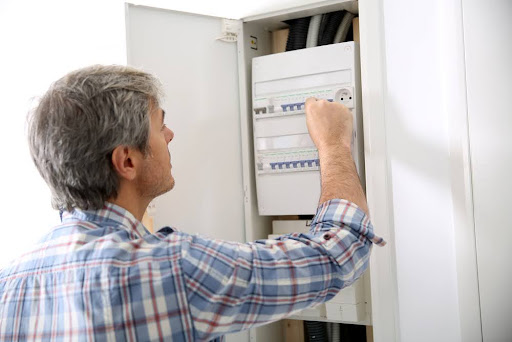Are you tired of being left in the dark thanks to a blown fuse? It’s time to put an end to the inconvenience and potential safety risks with Magnify Electric. Our team isn’t just a bunch of electricians; we’re like detectives for your electrical system, digging deep to figure out why those fuses keep blowing and fixing it for good. We’re all about making your life easier and safer. So, if you’re dealing with a finicky fuse box, call us today and let us turn those electrical woes into a thing of the past.
The Basics of Your Home’s Electrical System
The heart of this system lies in the fuse box or modern electrical panels, which house the internal switches (fuses or circuit breakers) that protect your home from electrical overloads and short circuits. When too much current flows through the electrical circuit, these protective devices are designed to cut off the power supply, thereby preventing potential damage to the electrical system or, worse, a fire. Understanding this is the first step toward resolving persistent issues with blown fuses.
Common Causes of Fuse Blowouts
Electrical Overloads
One of the most frequent culprits behind a blown fuse is an overloaded circuit. This occurs when too many appliances or devices are running on the same circuit simultaneously, exceeding the capacity of the electrical wiring. Old fuse boxes and outdated electrical systems are particularly susceptible to this problem, as they were not designed to handle the energy demands of modern appliances. An overloaded circuit not only results in a blown fuse but can also pose a significant safety hazard if not addressed promptly.
Short Circuits
Another common cause of a blown fuse is a short circuit, a more serious issue where a hot wire comes into contact with a neutral wire. This contact creates a path of least resistance, allowing a massive flow of current that can overwhelm the circuit. Short circuits can occur due to faulty wiring, damaged electrical outlets, or when insulation wears out. Identifying and fixing short circuits requires professional expertise, as they can be challenging to detect and dangerous to handle.
Faulty Appliances or Wiring
Faulty appliances or wiring are also to blame for frequent fuse blowouts. Appliances with damaged cords or internal faults can draw more power than they should, leading to a blown fuse. Similarly, old or damaged wiring can degrade over time, unable to handle the electrical load safely. These issues disrupt your daily life and put your home at risk of electrical fires, so timely intervention is important.
Diagnosing the Problem
When a fuse blows repeatedly, it’s a clear sign that your electrical system is crying out for help. Diagnosing the root cause, however, is not always straightforward. A thorough electrical inspection is required to identify overloaded circuits, short circuits, or faulty wiring. Professional electricians, like those at Magnify Electric, possess the tools and expertise necessary to pinpoint the exact cause of the problem accurately. They can assess your electrical system, identifying potential hazards and inefficiencies that might not be apparent at first glance.
Preventative Measures and Solutions
Preventing future blowouts involves addressing the identified issues head-on. This might mean reallocating appliances to different circuits to prevent overloads or to replace old and worn-out wiring that poses a risk of short circuits. In some cases, installing additional electrical outlets can help distribute the electrical load more evenly. Taking these steps helps prevent frequently blown fuses but also enhances the overall safety and efficiency of your electrical system.
Upgrading Your Electrical System: Is It Time?
One of the most challenging things for homeowners to figure out is whether it’s time to upgrade their electrical system. Many of the warning signs that let you know it’s time can be easy to overlook, while others are concerning but you may try to do something less drastic to address it. Here are some of the most common warning signs that it’s time to upgrade your electrical system:
- Frequent Circuit Breaker Trips: If you notice your circuit breaker tripping more often than usual, it might be a sign that your current electrical system can’t handle your power needs.
- Overuse of Extension Cords: Relying heavily on extension cords indicates that you have insufficient outlets for your needs, suggesting it’s time for an upgrade.
- Flickering or Dimming Lights: When lights flicker or dim, especially when using appliances, it’s a hint that your electrical system is struggling to distribute power effectively.
- Outdated Electrical Panels: Electrical panels over 25 years old are likely not equipped to handle modern electrical demands. Upgrading can enhance safety and functionality.
- Renovations or Additions: If you’re planning to renovate or add to your home, upgrading your electrical system ensures it can support additional loads.
- Use of High-Power Appliances: New high-power appliances like HVAC systems or electric ranges may require more power than your current system can deliver.
- Safety Concerns: Outdated wiring or systems not up to current codes can pose significant safety risks. An upgrade can address these concerns.
- Increasing Energy Bills: An inefficient electrical system can lead to higher energy bills. Upgrading can improve energy efficiency and reduce costs.
Don’t Blow a Fuse Over a Blown Fuse! Call Magnify Electric!
Experiencing repeated fuse blowouts can be frustrating, not to mention hazardous. But there’s no need to let this issue disrupt your peace of mind. At Magnify Electric, we understand the intricacies of residential and commercial electrical networks. Our team of certified electricians can diagnose, repair, and upgrade your system, safeguarding its performance. Contact us today to prevent a small annoyance from becoming a major hazard.

